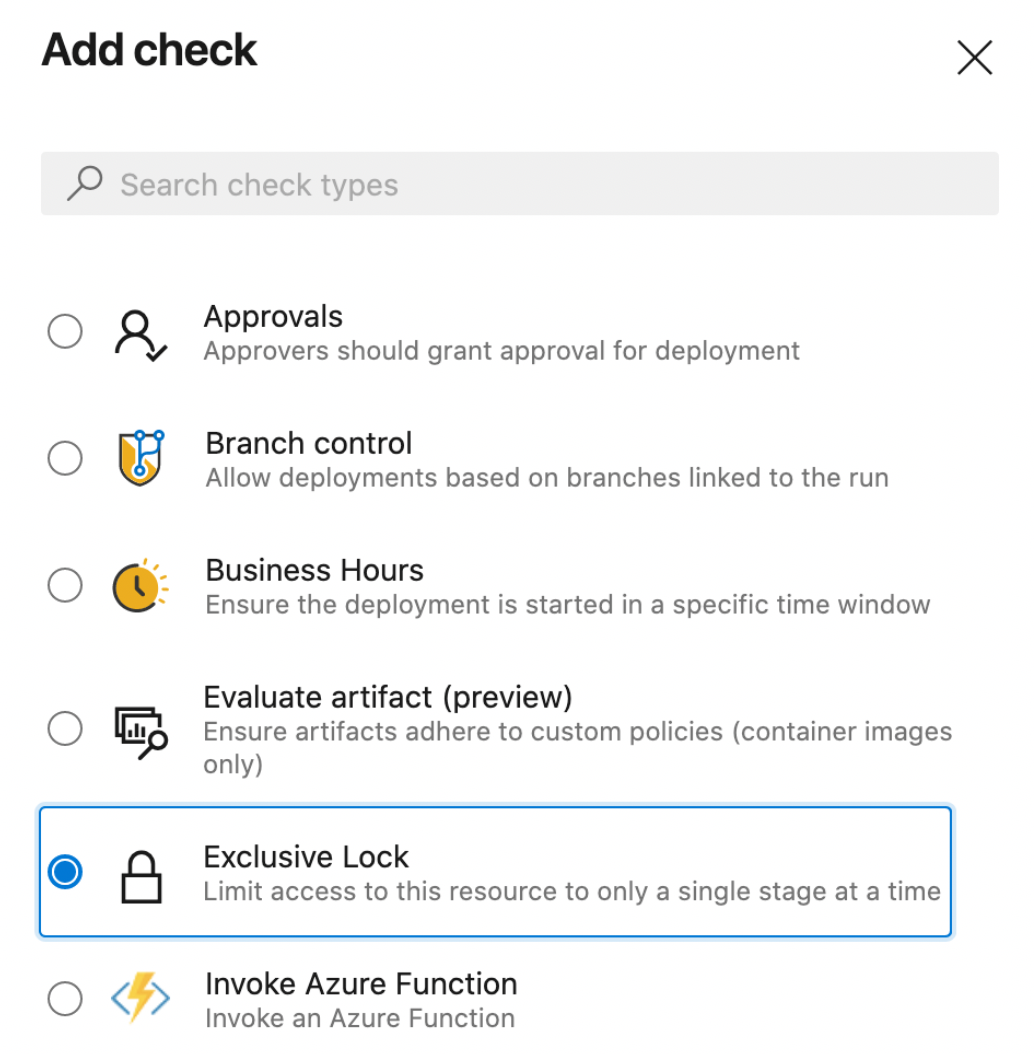As part of Sprint 171, the Azure DevOps team introduced a much needed feature for Multi-Stage YAML Pipelines, the Exclusive Lock "check" that can be applied to your environments. This feature silently slipped into existence without any mention of it in the release notes, but I was personally thrilled to see this. (At the time this post was written, Sprint 172 announced this feature was available)
Although Multi-Stage YAML Pipelines have been available for a while, there are still some subtle differences between their functionality and what's available through Classic Release Pipelines. Fortunately over the last few sprints we've seen a few incremental features to help close that feature parity gap, with more to come. One of the missing features is something known as "Deployment Queuing Settings" -- a Classic Release pipeline feature that dictates how pipelines are queued and executed. The Exclusive Lock check solves a few pain points but falls short on some of the more advanced options.
In this post, I'll walk through what Exclusive Locks are, how to use them and some other thoughts for consideration.
Deployments and Environments
Let's start with a multi-stage pipeline with a few stages, where we perform CI activities and each subsequent stage deploys into an environment. Although we could write our YAML to build and deploy using standard tasks, we're going to use the special "deployment" job that tracks builds against Environments.
trigger:
- master
stages:
- stage: ci_stage
...steps to compile and produce artifacts
- stage: dev_stage
condition: and(succeeded(), eq(variables['Build.SourceBranch','refs/heads/master'))
dependsOn: ci_stage
jobs:
- deployment: dev_deploy
environment: dev
strategy:
runOnce:
deploy:
... steps to deploy
- stage: test_stage
dependsOn: dev_stage
...
If we were to run this hypothetical pipeline, the code would compile in the CI stage and then immediately start deploying into each environment in sequence. Although we definitely want to have our builds deploy into the environments in sequence, we might not want them to advance into the environments automatically. That's where Environment Checks come in.
Environment Checks
As part of multi-stage yaml deployments, Azure DevOps has introduced the concept of Environments which are controlled outside of your pipeline. You can set special "Checks" on the environment that must be fulfilled before the deployment can occur. On a technical note, environment checks bubble up from the deployment task to the stage, so the checks must be satisfied before the stage is allowed to start.
For our scenario, we're going to assume that we don't want to automatically go to QA, so we'll add an Approval Check that allows our testing team to approve the build before deploying into their environment. We'll add approval checks for the other stages, too. Yay workflow!
At this point, everything is great: builds deploy to dev automatically and then pause at the test_stage until the testing team approves. Later, we add more developers to our project and the frequency of the builds starts to pick up. Almost immediately, the single agent build pool starts to fill up with builds and the development team start to complain that they're waiting a really long time for their build validation to complete.
Obviously, we add more build agents. Chaos ensues.
What just happen'd?
When we introduced additional build agents, we were expecting multiple CI builds to run simultaneously but we probably weren't expecting multiple simultaneous deployments! This is why the Exclusive Lock is so important.

By introducing an Exclusive Lock, all deployments are forced to happen in sequence. Awesome. Order is restored.
There unfortunately isn't a lot of documentation available for the Exclusive Lock, but according to the description:
“Adding an exclusive lock will only allow a single run to utilize this resource at a time. If multiple runs are waiting on the lock, only the latest will run. All others will be canceled."
Most of this is obvious, but what does 'All others will be canceled' mean?
Canceling Queued Builds
My initial impression of the "all other [builds] will be canceled" got me excited -- I thought this was the similar to the “deploy latest and cancel the others” setting of Deployment Queuing Settings:
Unfortunately, this is not the intention of the Exclusive Lock. It focuses only on sequencing of the build, not on the pending queue. To understand what the “all others will be canceled” means, let's assume we have 3 available build agents and we'll use the az devops CLI to trigger three simultaneous builds.
az pipelines run --project myproject --name mypipeline az pipelines run --project myproject --name mypipeline az pipelines run --project myproject --name mypipeline
In this scenario, all three CI builds happen simultaneously but the fun happens when all three pipeline runs hit the dev_stage. As expected, the first pipeline takes the exclusive lock on the development environment while the deployment runs and the remaining two builds queue up waiting for the exclusive lock to be released. When the first build completes, the second build is automatically marked as canceled and the last build remains begins deployment.
This is awesome. However I was really hoping that I could combine the Exclusive Lock with the Approval Gate to recreate the same functionality of the Deployment Queuing option: approving the third build would cancel the previous builds. Unfortunately, this isn’t the case. I’m currently evaluating whether I can write some deployment automation in my pipeline to cancel other pending builds.
Wrapping Up
In my opinion, Exclusive Locks are a hidden gem of Sprint 171 as they’re essential if you’re automatically deploying into an environment without an Approval Gate. This feature recreates the “deploy all in sequence” feature of Classic Release Pipelines. The jury is still out on canceling builds from automation. I’ll keep you posted.
Happy coding!

0 comments:
Post a Comment